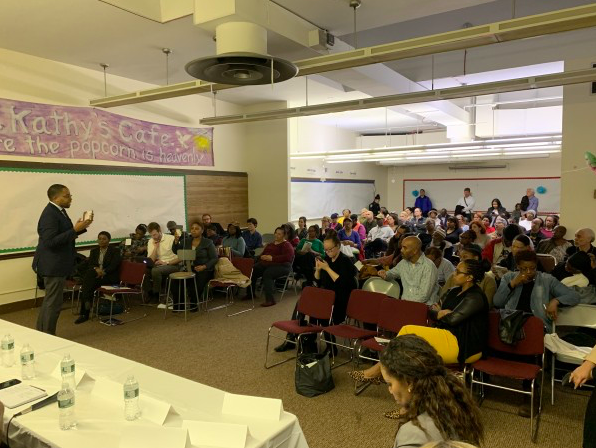Heated Questions On Housing At Crown Heights Forum

CROWN HEIGHTS—State Sen. Zelllnor Myrie hosted a dozen city representatives and advocates on Thursday who informed residents on housing issues including the recent change in the city’s area median income.

The area median income (AMI) for a family of three has increased to $96,100, up from $93,900 in 2018. The U.S. Department of Housing and Urban Development publishes the amount annually and the figure is used to determine eligibility for affordable housing. Along with all five boroughs, the government uses the income of residents in Westchester, Putnam and Rockland counties to determine New York City’s AMI.
News of the AMI update came from Lacey Tauber of the New York City Housing Preservation and Development who said the city agency is scaling back on units with 130% AMI.
“Our programs in our new construction serve every range from units of formerly homeless which actually sometimes go below 30% AMI but the units we finance that go through the lottery, it starts from 30% which starts at $28,830 for a family of three and it goes all the way up to 30%, although we’re doing fewer and fewer of those units.”
You can see the updated AMI scale here.

The 12-person panel also addressed how slowly HPD responds to affordable housing applicants.
“Another reason why it takes so long to process is that because we’re in a housing crisis and there’s a huge demand for housing,” said Marcela Mitaynes who added that a project with 50 units can get up 3,000 to 5,000 applications.
Questions as to the legality of “buy-outs” also arose and panelists confirmed that a landlord can offer tenants money to vacate their rent-stabilized apartments. But landlords have to make the offer in writing and cannot ask again for another year and if they do they can be accused of tenant harassment.
Relatedly, Kerrie Hill of the New York State Attorney General’s office confirmed that Gov. Cuomo is expected to sign the Tenant Protection Act of 2019 which would widen the scope of what it means for a landlord to harass a tenant.
HPD is also creating a new anti-harassment taskforce including 10 new staff members and two attorneys which would increase inspections from 200 to 1500 units.
Halfway through the meeting, the conversation turned towards the Department of Buildings and how they plan to enforce penalties on developers with a history of violations.
“Historically our enforcement action in terms of construction focuses on the owner, but a lot of our strong enforcement powers go to the contractor,” said Benjamin Colombo of the Department of Buildings. “We do have the ability to take away contractor’s licenses,” he added noting that DOB cannot prevent someone from buying buildings, however.
Colombo went onto say DOB is proactively inspecting high- and low-rise buildings especially as it relates to safety.
The forum also tackled NYCHA and the new rental-assistance demonstration program (RAD) program. Attendees asked how they would be guaranteed affordable rents. The program addresses repair and capital needs of the city’s 400+ city housing buildings. NYCHA officials are looking to convert 5,000 units a year with 62,000 over the next 10 years.
Tenants who live in RAD develops go from a Section 9 subsidy structure to a Section 8 where the rental cost is capped at 30% of a tenant’s rental income, according to Brian Honan of NYCHA.
But according to a representative of Flatbush Tenants Association, some residents currently pay less than 30% and could risk a rent hike.
Homeowners inquired about Third Party Transfers (TPT), a controversial de Blasio program that transfers tax-defaulted properties from homeowners to non-profit organizations. But the HPD rep couldn’t comment on
“The idea is that the program identifies buildings that have a high level of arrears and also HPD high-level of violations, maintenance of the building,” said Tauber who could not elaborate because of ongoing litigation.
But Myrie, a prime sponsor of one of the nine bills being proposed ahead of the expiration of NY’s rent laws, spoke candidly about the controversy surrounding the TPT program.
“I know what I can say,” said Myrie. “I would encourage folks to look into the third-party-transfer program. There was just a court case that was just resolved. There were a number of property owners that had their homes essentially stolen from them and they took it took the court and the judge ruled that in this particular instance the TPT program did not work as it was intended.”




